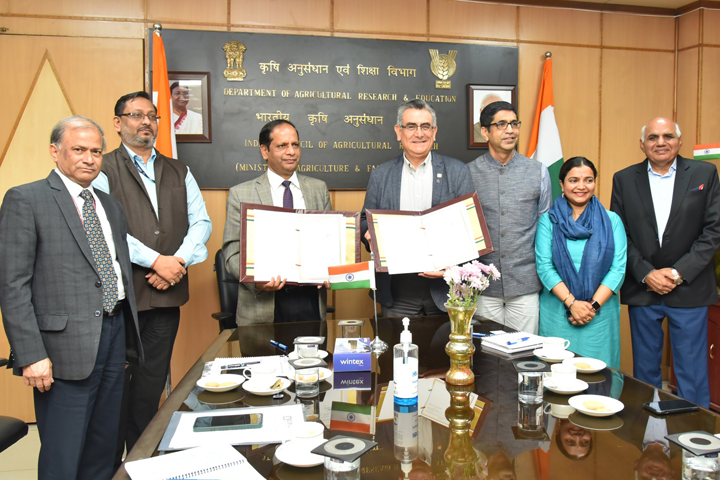With almost 18 percent of the world’s population but less than 1.5 percent of its farmland, India has prioritized increasing agricultural productivity, farmer income, and country-wide food security. The International Potato Center (CIP) has contributed to those objectives for nearly 50 years by collaborating with Indian institutions and farmers to harness the potential of root and tuber crops to produce more nutritious food on the same land and, often, with less water than other crops.
CIP has collaborated for decades with the Indian Council of Agricultural Research (ICAR) by sharing breeding material, building capacity, and improving seed systems. More recently, CIP has also promoted sustainable, climate-resilient agronomic practices. That collaboration is entering a new phase as CIP and ICAR leadership recently signed a five-year work plan.

Oscar Ortiz, interim Director General of CIP and Senior Director of Crop Based Systems in CGIAR, traveled to India last week to meet with Manoj Ahuja, Secretary of Agriculture and Farmers Welfare, Himanshu Pathak, Director General of ICAR and Secretary of the Department of Agricultural Research and Education, and Anand Kumar Singh, Deputy Director General for Horticulture at ICAR, and to sign a collaborative work plan for the next five years. Ortiz joined Samarendu Mohanty, CIP Regional Director for Asia, and Sampriti Baruah, Asia Project Coordinator, in sharing details of CIP’s contributions to Indian agriculture and discussing common goals for the coming years.
“CIP and ICAR have been collaborating since 1975, and from the beginning, CIP has been committed to making its technologies available, particularly potato germplasm for use in breeding improved varieties,” Ortiz said.
“Over the next five years, CIP will be working in close partnership with the Central Potato Research Institute using CIP germplasm to develop market-demanded potato varieties and, in tandem with the Central Tuber Crops Research Institute, toward the release of at least one orange-fleshed sweetpotato variety,” said Mohanty.
Based on consultations with scientists at ICAR’s Central Potato Research Institute and Central Tuber Crops Research Institute, the new agreement proposes an interdisciplinary approach for the next five years (2022-2027). Research will be conducted at a system level to address the food and nutrition security of millions of smallholders in rice-based cropping systems, and will be organized under the following five themes:
- Developing market-demanded potato varieties using CIP germplasm & breeding clones;
- Field trials and release of pro-vitamin-A biofortified orange-flesh sweetpotato;
- Cropping systems and natural resource management under changing climates;
- Socio-economic, gender, value chain, marketing, adoption and impact assessment;
- Integrated capacity building of national scientists.
Harnessing potato power
Potato farming and consumption in India have expanded exponentially over the past half century, as national production increased from 1.5 million tons in 1950 to more than 48 million tons in 2017. Nevertheless, research shows that there is plenty of room to further exploit the tuber’s potential to improve food security, nutrition, and income.
One study published in 2019 showed that while many Indian farmers have adopted disease-resistant and drought- or heat- tolerant potato varieties, enhancing their resilience in the face of climate change, wider adoption of even more robust and resilient varieties, and other technologies, are needed to meet the challenges of feeding a growing population and adapting tp future climates. The researchers noted that early maturity (harvestable potatoes within 70—90 days after planting) is the most promising climate-smart characteristic, since it enables farmers to grow a crop of potatoes on land primarily used for rice or other grains during a three-month window between grain crop cycles.
CIP has shared more than 100 potential varieties from its breeding program with ICAR that have traits such as early maturity, heat or drought tolerance, disease resistance or high nutritional content. ICAR scientists are evaluating them at 19 field stations for selection of varieties apt for released to farmers. ICAR has already released several CIP-bred, climate-smart potato varieties in recent years, and more are in the pipeline for release relatively soon.
In order to get improved varieties into farmers’ fields, CIP has facilitated widespread, rapid production of quality potato seed. Promotion and capacity building in aeroponic and apical rooted cutting technologies has increased farmer access to affordable quality seed, which boosts productivity and income. Those technologies are also improving the incomes of people who took advantage of the sustainable business opportunity that seed production presents. At the same time, CIP is promoting and studying the use of early-maturing potatoes in the sustainable intensification of rice-based farming systems through cost-effective, environmentally friendly practices such as zero tillage.
CIP’s collaboration with ICAR and partners such as the Potato Technology Center in Haryana and Centre of Excellence for Research and Development of Potato and Sweetpotato in Karnatak will build upon recent achievements to enable a growing number of smallholder farmers to access quality seed of improved potato varieties. Together with appropriate agronomic practices, those varieties will help a growing number of farmers increase their food production, income, and resilience in the face of climate change.
